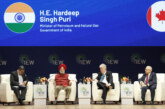WTO Deal
By Dr Arvind Kumar
India’s refusal to accept a four-year ‘peace clause’ for ostensibly breaching farm subsidy caps under the World Trade Organization’s Agreement on Agriculture (AoA) has been vindicated at at the recently held meeting of WTO at Bali (Indonesia). The germane issue here is not about our sovereign right to provide unlimited agricultural subsidies or to keep them insulated from the global rules of trade. The problem lies – and those accusing India of having played a deal-breaking role would do well to take a closer look at them – in the AoA’s rules itself, which are hopelessly flawed and outdated. Fortunately, the Indian position – that the ‘peace clause’ remains in force until a permanent solution is found to food security and, indirectly, the farm subsidy computation issue – has prevailed at the Bali ministerial meet. It is a just victory. However, civil societies in Asia are calling for an end to the WTO and pushing for alternatives.




